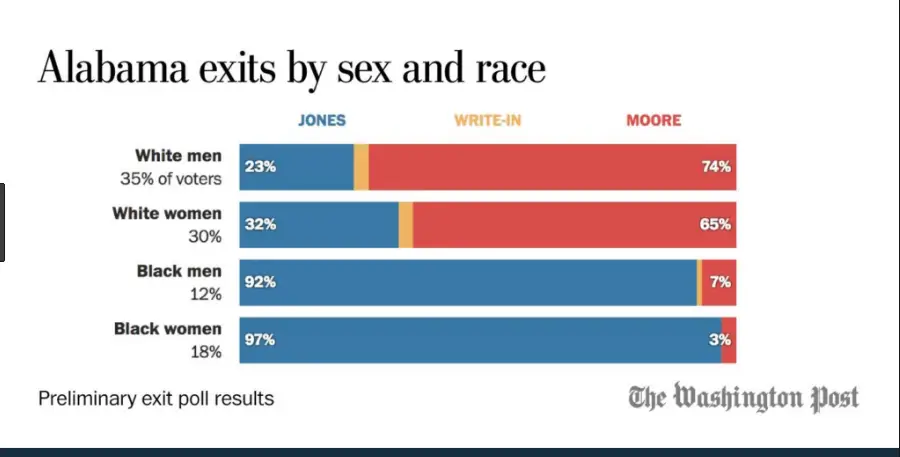One of many terrifying moments this year was watching President Donald Trump, self-proclaimed “pussy grabber” and accused harasser of over fifteen women, openly endorse Senator Roy Moore, alleged child molester and recorded bigot, for Senate. I suppose birds of a feather flock together, so this wasn’t shocking, but many were hopeful that we couldn’t possibly sink this low.
However, on Tuesday night, a triumphant moment happened when Democrat Doug Jones, a former U.S. attorney, won the election over Republican Roy Moore by a razor thin margin of 1.5 percent. The final results were 49.9 percent in favor of Jones and 48.4 percent in favor of Moore, with 1.7 percent write-in votes. Having won the special election, Jones will now fill in the U.S. Senate seat left by Jeff Sessions when he became Attorney General, flipping a traditionally red state. Jones previously served as the U.S. attorney for the Northern District in Alabama. He is well known for his prosecution of KKK members from the infamous 1963 church bombing and an indictment against the Olympic Park Bomber.
The time leading up the election was contentious on Moore’s part. Four women came forward with allegations of sexual assault, most notably occurring when the women were in their teens and the former senator in his thirties. Several others claimed inappropriate behavior or Moore pursuing unwanted romantic relationships, again with the victims being between sixteen and twenty-two. At a September rally, he gave a personal take on the meaning of MAGA: “I think it was great at a time when families were united, even though we had slavery, they cared for one another,” he said. “People were strong in the families. Our families were strong, our country had a direction, and we corrected many of the problems.” Kayla Moore, Roy’s wife, attempted to clear up accusations of bigotry with comments that bordered on satirical. “Fake news would tell you that we don’t care for Jews. I tell you all of this because I’ve seen it all, so I just want to set the record straight while they’re here. One of our attorneys is a Jew.”
Even given Moore’s past, victory for Jones was not guaranteed. Polls before the election were sparse (only three met the qualifications to be used in the RealClearPolitics average), but showed the race to be neck in neck, with the “Washington Post” reporting 50 percent for Jones and 47 percent for Moore, and Emerson College Polling Society reporting Moore leading by 6 percent. Even though Senator Moore received some condemning reactions after the child molestation stories broke, he was still endorsed by both President Trump and the Republican National Committee. Following this approval, many senators came back around in support of Moore.
Jones’ election is a triumph, and shows that perhaps bigotry and misogyny will not be tolerated, even if it comes with a presidential stamp of approval. As Jones said, “We have shown, not just around the state of Alabama, but we have shown the country the way that we can be unified.” This win is especially remarkable given that historically, Alabama is dependably red. Jones’ victory echoes the optimism seen in many state elections last month. Maybe we have reason to be hopeful about future elections.
Before we get too congratulatory however, it’s vastly important to understand who won the election for Jones. Taking a closer look at the breakdown of the voting results, we can see that 30 percent of white voters and 96 percent of black voters supported Jones. Additionally, Jones was supported by 57 percent of female voters and 60 percent of young voters.

The divide in race is remarkable, especially so when parsed by gender. Black women showed the most support for Jones, evidenced by a 98 percent voting rate. White female voters, in comparison, overwhelming supported Moore. Sixty-three percent of white women supporter Moore. Black male voters were a close second in support of Jones at 93 percent. White men, to probably no one’s surprise, had the lowest voting rates for Jones at 26 percent. Black Americans won the race for Jones.
Exit polls also showed that 28 percent of voters were black, larger than their population proportion of 26 percent. This is particularly outstanding considering the fact that black voters are the most disproportionately impacted by voter suppression efforts such as DMV closures, restrictions on those with felony records and stringent voter ID laws. As Vann R Newkirk wrote for “The Atlantic,” “Black voters were informed and mobilized to go vote, and did so even in the face of significant barriers.”
What is most notable is the overwhelming support and the integral part that black women played in the election. Historically, black women have been a loyal and dependable voting block for Democrats. In fact, in both the 2008 and 2012 election, black women had the highest voter turnout of any gender or racial group, at a whopping 70 percent of eligible voters. Black women have proved again and again that they are one of the most valuable bases of the Democratic party, even though they are often the most oppressed, vulnerable and ignored.
This election shows that white women have a long way to go. Moore’s position as an accused child molester and perpetrator of sexual assault, his alleged violence against women and girls, was not enough to turn them. This is likely due to centuries of internalized misogyny, an internalized belief that women and men are simply not equal, held by both men and women. As Marcie Bianco wrote for NBC, “White women ally themselves with white men for what they believe is their own gain, security, and assurance, while not realizing the harm caused by the internalized misogyny that fuels their cognitive dissonance and consequential support of men who abuse women.” This senate election is not a unique occurrence. The 2016 presidential election showed a similar trend. A majority of white women, 53 percent, said they voted for Trump, whereas 93 percent of black women supported Hillary Clinton.
Jones’ victory is an exciting one, and it shows promise for future elections. However, we can’t ignore the dynamics of voters that played out. Black Americans were a driving force in this win, even though as a group, most feel taken for granted by the Democratic Party. Black women especially made a huge difference in this election (and many others), despite the fact that they are often the least protected and represented in politics. It is not enough to thank black women, but we must support them too. Both Democrats and the feminist movement have a long way to go in giving black women the respect, space and platform they deserve.

















